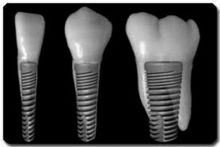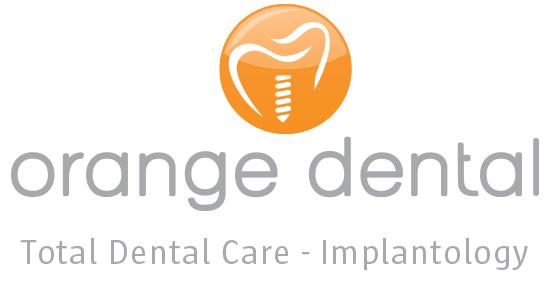Implantology
Teeth have a visible part (crown) and an invisible part (root). If a tooth needs to be removed, they can place a substitute crown or bridge. If, however, you are missing a tooth, root and all, they cannot a place a crown. A bridge is a feasible option in that case, but only if there is a sufficient number of healthy adjacent teeth to attach it to.
Fortunately, we can nowadays use implants (artificial roots) in such a case, which provide a comfortable and durable solution. Implants are less expensive than generally believed.
What is an implant?
An implant looks like a screw and is made of body-friendly titanium, which fuses well to the jaw bone. This provides the basis for a crown or bridge. Implants can be inserted to replace one or more teeth or even all your teeth. Depending on the chosen solution, one or more implants are placed.
Aftercare
Most people do not experience much inconvenience after an implant has been placed. You can take ordinary painkillers if you feel any pain or if your gums are sensitive. It takes about two to three months for the implant to fuse with your bone. During this period you must make sure you do not exert too much pressure on it. You may therefore be required to change your diet temporarily. They will, of course, give you the necessary advice.
 
Cosmetic Dentistry
Cosmetic dentistry is a way of improving your appearance and the solution for those who are not satisfied with the shape, colour or position of their teeth. Many people still refrain from seeking cosmetic dental treatment, because they are afraid to see a dentist, think the treatment is very expensive, or just because they do not know what solutions are available.
Aesthetic dentistry that can give you ‘pearly white teeth’ and a ‘radiant smile’ is no longer just for the rich and famous. On the contrary. There have been revolutionary developments in this branch of dentistry over the past few years, resulting in all kinds of techniques that make this type of dentistry available and affordable to everyone. Furthermore, you no longer need to undergo painful treatments to restore your self-confidence and be able to smile again.
The most common techniques and solutions in aesthetic dentistry not only include placing (metal-free) ceramic crowns and facings, but also gum correction, replacing grey (amalgam) fillings by white fillings and tooth bleaching. These solutions are now part of our day-to-day work. Of course we also pay attention to the functional aspects of your teeth in aesthetic dentistry. You are thus always assured of the best result.
Root canal treatment
There may be various reasons why someone needs root canal treatment. The most common reason is severe toothache. The living part (the nerve) of the tooth may be inflamed to such an extent that they need to remove the nerve in order to stop the pain.
The inflamed living tooth tissue is removed during root canal treatment. This is done under local anaesthetics. Next, the canals are cleaned, disinfected and filled. The tooth is then closed again with filling.
If the root end is inflamed, the nerve in the tooth is already dead. The dead nerve tissue causes the inflammatory response. This root end inflammation can break through the jaw bone and cause an abscess. This can be very dangerous, particularly if the abscess is located in the lower jaw and on the side where the tongue is. It usually spreads to the side where the cheek is. If you have such an abscess, you should always go to the practice or, if they are not available, call their emergency number. The dentist on duty will then remove the dead nerve tissue from the root and clean the root canals. It will often be necessary to open the abscess and let the pus out. You will then be given antibiotics.
 
Periodontology (Gum problems)
Inflamed gum tissue looks soft, red and swollen and bleeds easily when you brush your teeth. A superficial gum inflammation is called gingivitis.
What causes gingivitis?
If you do not or not correctly brush your teeth, your teeth will get covered with plaque, a white/yellow sticky layer consisting of food remains, mucus and various types of bacteria. Plaque is particularly deposited along the edge of the gums.
If you do not remove plaque daily, bacteria may cause inflammation (gingivitis). Although initially superficial, this inflammation can progress to deeper layers.
Saliva may also cause plaque to calcify into tartar, a hard substance that you cannot remove yourself. You will then need to make an appointment with the dentist or dental hygienist. If gingivitis is left untreated, it may cause periodontitis. And that’s even worse!
Periodontitis
If gingivitis is left untreated for too long, the superficial plaque/tartar may spread below the gums. The bacteria will then nestle between the teeth and gums and subsequently break down the tissue and bone. This causes a pocket between the tooth and gum, which gradually fills with plaque and tartar. If this destruction reaches the root end, the teeth will lose their hold on the support tissue (periodontium) and will become loose.
Healthy gums: essential for a good set of teeth
They check your gums during every visit, to see whether the transition between the fillings and teeth is still smooth and whether there are no pockets under the gums.
Your gums in top condition
Where necessary, plaque and tartar are removed. They can also apply tooth-protective substances such as fluoride and polish your teeth. If you have gum problems that threaten your oral hygiene, they draw up a treatment plan.
|
 |



